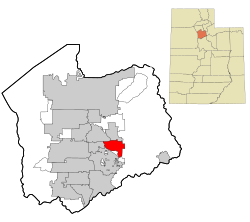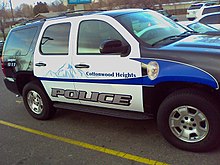Cottonwood Heights, Utah
Cottonwood Heights, Utah | |
|---|---|
City | |
 The old Cottonwood Paper Mill, built in 1883 by the Deseret News in Cottonwood Heights. | |
| Nickname: City between the canyons | |
 Location in Salt Lake County and the state of Utah | |
| Coordinates: 40°37′2″N 111°49′13″W / 40.61722°N 111.82028°W | |
| Country | United States |
| State | Utah |
| County | Salt Lake |
| Incorporated | January 14, 2005 |
| Named for | Cottonwood trees |
| Area | |
• Total | 9.23 sq mi (23.91 km2) |
| • Land | 9.23 sq mi (23.91 km2) |
| • Water | 0.00 sq mi (0.00 km2) |
| Elevation | 4,823 ft (1,470 m) |
| Population | |
• Total | 33,617 |
| • Density | 3,600/sq mi (1,400/km2) |
| Time zone | UTC−7 (Mountain (MST)) |
| • Summer (DST) | UTC−6 (MDT) |
| Area code(s) | 385, 801 |
| FIPS code | 49-16270[3] |
| GNIS feature ID | 1440025[4] |
| Website | cottonwoodheights |
Cottonwood Heights is a city located in Salt Lake County, Utah, United States, along the east bench of the Salt Lake Valley. It lies south of the cities of Holladay and Murray, east of Midvale, and north of Sandy within the Salt Lake City, Utah Metropolitan Statistical Area. Originally a census-designated place (CDP), following a successful referendum in May 2004, the city was incorporated on January 14, 2005. The population, as of the 2020 census, was 33,617.[2]
The corporate offices of Instructure, Dyno Nobel, the defunct Fusion-io, Extra Space Storage, Breeze Airways, and JetBlue are located in the city.[5]
Geography
As the city's name suggests, its geography is dominated by a high ridge separating the valleys of the Big and Little Cottonwood Creeks. At the eastern edge of the city, these valleys narrow into the Big and Little Cottonwood Canyons within the Wasatch Mountains, respectively. This is reflected by the city's official nickname, "City between the canyons". The ridge is covered in suburban housing, but most commercial development has been restricted to the lower-lying areas north of the ridge (along Fort Union Boulevard, in Fort Union itself, and near Big Cottonwood Creek and the "Old Mill" in the northeast corner of the city).
State Route 190 and State Route 210 run near the eastern edge of the city and provide access to the canyons; they are the only state routes that enter the city. Interstate 215 runs along the northern border of the city, and State Route 152 touches the city at a point. The city is building a multi-use trail along the full length of Big Cottonwood Creek within its borders.
Cottonwood Heights is in the Canyons School District; Brighton High School is the only public high school. Butler Middle School is the only middle school within city limits.
According to the United States Census Bureau, the CDP had a total area of 6.8 square miles (17.6 km2), all land.
Demographics
| Census | Pop. | Note | %± |
|---|---|---|---|
| 1980 | 22,665 | — | |
| 1990 | 28,766 | 26.9% | |
| 2000 | 27,569 | −4.2% | |
| 2010 | 33,433 | 21.3% | |
| 2020 | 33,617 | 0.6% | |
| source:[6] | |||
According to estimates from the Kem C. Gardner Policy Institute of the University of Utah,[7] as of 2015, there were 34,234 people living in Cottonwood Heights. The racial makeup of the county was 86.57% non-Hispanic White, 0.81% Black, 0.60% Native American, 4.51% Asian, 0.88% Pacific Islander, and 2.34% from two or more races. 4.29% of the population were Hispanic or Latino of any race.
Local media
- The Cottonwood/Holladay City Journal (tabloid-style newspaper), covering local government, schools, sports, and features.
Police services

On January 8, 2008, the Cottonwood Heights City Council voted to create its own police department and withdraw from its current contract with the Salt Lake County Sheriff's Department.
Notable people
- Jackson Barton, American football tackle
- Cody Barton, American football linebacker
- Greg Curtis, former Speaker of the Utah House of Representatives
- Tristan Gale, Olympic gold medalist
- Gordon Hudson, American football tight end
- Bryan Kehl, American football linebacker
- Trevor Lewis, ice hockey player
- Reno Mahe, American football running back
- Post Malone, musician
- David Neeleman, former CEO of JetBlue Airways
- Boyd K. Packer, Latter-Day Saint leader
- Mark Shurtleff, former Utah Attorney General
- Scott Johnson, cartoonist
- William R. Walker, Canadian-American Mormon leader
See also
References
- ^ "2019 U.S. Gazetteer Files". United States Census Bureau. Retrieved August 7, 2020.
- ^ a b "QuickFacts: Cottonwood Heights city, Utah". United States Census Bureau. Retrieved July 27, 2023.
- ^ "U.S. Census website". United States Census Bureau. Retrieved January 31, 2008.
- ^ "US Board on Geographic Names". United States Geological Survey. October 25, 2007. Retrieved January 31, 2008.
- ^ "Heights of livability in Utah?". Deseret News. Archived from the original on February 12, 2009. Retrieved January 6, 2008.
- ^ "CENSUS OF POPULATION AND HOUSING (1790-2000)". U.S. Census Bureau. Retrieved July 31, 2010.
- ^ "Salt Lake City Data Book 2017" (PDF). Kem C. Gardner Policy Institute. Retrieved April 16, 2018.

